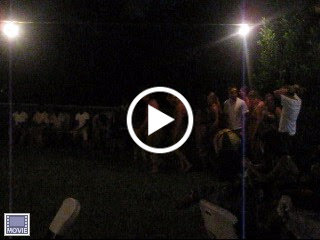Calvin College holds a semester in Ghana each year in the fall. On
average there are approximately 20 students - usually more females than
males. Most of the students are juniors or seniors, and many seem to be from the International Development or Social Work departments, although
there is often a variety of majors represented. I have had the
privilege of getting to know the professors and students over the past
three years, as they live and attend classes at the University of Ghana,
and study the land and culture of Ghana. Each prof that leads the
course has a different emphasis, depending on the prof. The Reed family
has struggled with envy over the fact that this group gets four months
to study the culture in depth, tour all ten regions of the
country, learn the local language of Twi, take African studies and religion classes,
participate in festivals, and more. After four months they leave, having seen more of Ghana than we have in thirty months we have been here. Hannah
has been tempted to take this semester in Ghana - providing that we are
still living here.
 |
| Melanie and John, in the center, with |
This year the semester was done a bit differently, with the classes
condensed to three days per week, and pairs of students being sent out
to various schools and nonprofits to conduct various studies on
ethnography (the scientific study of the customs of people and
cultures). Two students were assigned to our partner, Hopeline Institute: Melanie
Evans and John Veneklasen, who both had a special interest in
business development.
In addition to studying
ethnography, these two had specific objectives for Hopeline. The first
was to conduct an impact assessment on the Village Savings and Loan
(VSL) program (see earlier blogs for more info on this program) from the
perspective of the individual, family, group, and community. The
second objective was to help collect some media on the program - write
some stories about individuals and VSL groups and create a brief video
on the program. John and Melanie gallantly set out on motorcycles to
drive with the field officers out into the villages where Hopeline
Institute is doing their work.
They observed twenty VSL groups and then focused in specifically on four groups: one made up of young adults, one women's group, one generally diverse group, and one group that had significant challenges. In general they found that these groups work very well, with both individuals and communities benefiting, not just financially but also through trust, compassion, and the strengthening of communal ties. They found that women especially are benefiting. One person shared, in talking about their savings, "We are sitting on gold!" They had not recognized their savings potential before and have been able to increase their family's economic standing. They had a lot of other great feedback as well. These results were not surprising to us - it is what we also have seen - but to have independent persons come to do their own assessment and find similar conclusions is reassuring. The funding for this program comes to an end in June 2012, so Hopeline is working hard to figure out how to make this program sustainable so that they can continue to reach the 4000+ persons.
We are thankful to John and Melanie and wish them success as they return to the US!
On Monday, December 5,
the students had their farewell dinner and showcased their new dancing
skills as can be seen in the video below. The very first couple to do
their solo number is Melanie and John. (The dance was performed outside in the evening, so unfortunately it's a little dark. Sorry!)















